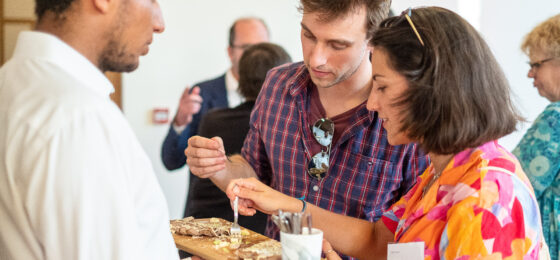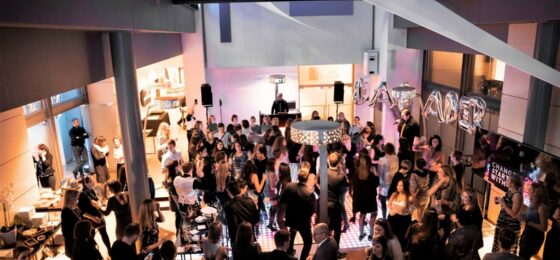Myths vs reality. True v false
Introduction
What people say and believe about event planning isn’t all true. A lot is based on personal experiences, unrealistic expectations and plain old guessing.
Is event planning an easy and glamorous career path? Are corporate events a big waste of time? Do hybrid events even work anymore in a post-COVID world? This Brussels Special Venues post exposes the most common event myths and provides the real scoop on what the event space is really like.
Corporate Events Misconceptions
While they might be everywhere, people sometimes view corporate events as distracting, a cringe-fest or expensive. So, are they important or a big waste of time? Do we need them to grow companies and keep companies happy, or can we skip them and still experience success and a satisfied workforce?
Let’s clear the air on a few common event myths and how they play out in the real world.
“It’s Time Better Spent Working”
Team-building exercises are fun but silly games that keep people from working, right? Wrong. If you’re under the impression that the time building rafts is better spent at the office, hear us out.
Contrary to popular belief, corporate events, often typified as huge time wasters, are valuable for your staff.
Whether workshops, seminars, luncheons or adventures, – all this downtime can promote job satisfaction and make people more productive. This leads to happy staff who work better, which we can all agree is good for everyone! So, always appreciate the power of work events to keep your staff engaged and motivated.
“Corporate Events are Dull, Cringeworthy and Unwanted”
We get it; forced socialising with colleagues or industry players is hardly thrilling.
Great news: modern corporate events have come far since awkward meetups and boring seminars. Event planners have found new ways to entertain you, offering activities catering for all interests.
So the next time you see those work event emails – don’t groan. They can be insightful, refreshing, or even make you feel good, so don’t believe this event myth.
“Corporate Events Waste Company Funds”
Many think company events are geared toward big organisations – big spenders with massive budgets to shower their staff members or impress guests with fancy parties. Smaller companies might figure, “Why waste limited funds on elaborate shindigs when more pressing needs exist?
There are two problems with this thinking. The first is that functions don’t need to break the bank. You can tailor your budget and still make your staff happy or promote your business. The second is that hosting events isn’t just a cost. They can bring intangible returns and make you money. These benefits may encourage collaboration, communication and company spirit. These things can help grow your business!
Event Planning Myths
The movies make event planning seem glamorous, but that’s not always the reality. The job can be super stressful. Behind the scenes, long hours, fussy customers and unreasonable timelines aren’t uncommon.
Far from a Hollywood dream, let’s ditch a few myths about event production.
“The Work Is Done When the Event Starts”
Event planners work tirelessly to stage an event. Behind the scenes, it’s their job to arrange everything. From booking the caterers to securing the sound system, it’s a constant “go go go” environment. An important question is whether the work stops once the guests arrive.
No, there’s no time to feel relieved. Event planners will carry on, managing the event’s flow and ensuring it goes off flawlessly. They are not just responsible for the small wins; they also have to anticipate things going wrong. They’ll need to develop creative solutions while maintaining a calm and professional demeanour. All on the fly.
It’s finally time to unwind once the final guests leave, right? Almost. Depending on their contract, the planner might be responsible for post-event cleanup and leaving the venue spotless.
And that’s not all. Once the event has concluded, it’s time to reflect. Sometimes, an event planner might conduct a post-event evaluation or “post-mortem”, if you will. What went right during the event, and what areas must be improved for future events? Also, gathering feedback from attendees through the post-event market provides valuable insights.
“Events: Glamorous, Fun and Non-stop Parties”
You may imagine a lot of glitz and glamour, but event planning is not all about sipping cocktails and dressing up. Sadly, this event myth has no basis in reality.
Event planners juggle long hours, tight deadlines and the unexpected. There’s not much time for partying.
While parts can be enjoyable and offer rewarding moments, event planning is also stressful and demanding.
“Just Your Typical Nine-to-five Desk Job”
While event planning might occur in the hours of nine-to-five, it’s far from your standard office job.
Instead of closing your laptop and clocking off early, expect to work longer hours to cross everything off to-do lists, especially as the event approaches. And on the big day? Don’t be surprised if you pull 16-hour days, stopping only when the event concludes.
If you’re a successful event planner, your days, and sometimes nights, will likely be a whirlwind of activity, filled with many tasks and challenges.
“It’s Easy; Anyone Can Do the Job”
This is one of those common event myths that crumble two minutes into the job. That’s because event planning is anything but easy. From dealing with last-minute cancellations and difficult clients to sudden changes, the pressure is always on.
It’s hard work that requires blood, sweat, tears, and, as we’ve mentioned before, being okay with sacrificing some of your personal time.
And while having a creative mind is a useful asset for the job, successful event planning hinges on more than good ideas. In fact, the job requires a unique blend of creativity and practicality. Sure, a party theme might be unique, or top-notch entertainment is amazing, but does it fit your budget and timelines?
Party planning is a jack-of-all-trades job, demanding diverse skills. While you’ll learn some of them on the fly, event planning isn’t for everyone. It requires a cool head, the ability to bounce back after setbacks and impressive multi-tasking skills. Remember, from finance to PR to marketing and being a master problem solver, there’s so much you’re responsible for doing all at once.
“An Event Will Go Well if You’ve Meticulously Planned It”
This event industry myth is a complete urban legend.
Your best efforts and strive for perfection go far, but sometimes life can throw you a curveball. Unexpected challenges are not uncommon in event management. From inclement weather to tech meltdowns and kitchen disasters, party planning can go awry in countless ways. While it might not be your fault, you’ve got to think fast and fix it.
Flexibility in the face of the unexpected is key. More importantly, you must resolve issues on the spot, stay calm under pressure, and confidently show you can handle anything.
“All Planning Is the Same”
An event-planning pro knows that approaches to event planning will vary. To get it right, a tech conference needs to be planned differently from a wedding.
That’s sometimes why some event planners specialise. They choose a particular niche, learn the ropes and make important connections to throw killer events in that area.
“You Can Easily Plan an Event in a Week”
You might be told this by a client looking for a last-minute miracle worker. And while it may be possible to pull an event off within a few short days, it doesn’t mean you should.
It’s not always the best decision or worth blemishing your reputation over. Being rushed, the quality of your event might suffer, and without the luxury of time, more could go wrong.
And even if everything goes well, imagine the stress you’ll have to endure and how exhausted you’ll get.

Demystifying Tech-Heavy Event: Virtual & Hybrid
Technology dominates the event industry. And thanks to the COVID-19 outbreak, more cool tech and apps than ever are being used to plan and streamline events and make them more convenient.
But before you get swept up online, let’s clarify a few common event misconceptions in the tech-heavy space.
“Apps and Event Management Software Will Soon Replace Event Planners”
While event apps and software are undeniably cool and helpful, they’re not here to steal people’s jobs. Think of them as assistants of event planners rather than seasoned pros.
Their help with automating tasks and streamlining things never fails to impress, but they can’t substitute human expertise.
Planners bring the knowledge, skill, experience and special touch that apps simply lack.
“Hybrid Events Aren’t Relevant in a Post-covid World”
Four years after the pandemic, life has resumed to be relatively normal. Yet online and hybrid events don’t seem to be going away anytime soon. It’s a common event myth to think that they will.
But why should they? These types of functions are inclusive and accessible and allow attendees to work together, connect and participate worldwide. They remain as important as ever, if not more so, now that we know the different ways they can be used.
“It’s Hard to Engage Virtual Attendees”
Remote guests have joined your event for a reason. While there may be challenges to holding their attention, don’t let distance get in the way of an engaging session. You just need to be innovative and come up with creative hooks. Reel them in with virtual polls, bait them with Q&A sessions, and just try to keep things interesting.
“Hybrid Events Are Harder to Execute”
People believe that because there is a mix of virtual and in-person elements, hybrid events are, well, kind of a nightmare to plan.
Though, here’s the thing. Fewer in-person attendees mean fewer overheads and focusing more on finding the right virtual platform.
In that sense, hybrid events are just unique. They’re different from traditional events and require a different approach with new needs and considerations.
Conclusion
Heard myths swirling about the nature of functions, the scope of event planning or the future of hybrid events? This article clears things up.
Maybe you hate work events, see team building as pointless, think event planning is a breeze, or are on the fence about hybrid. We hope we’ve squashed a few of the preconceived event myths you might have.




